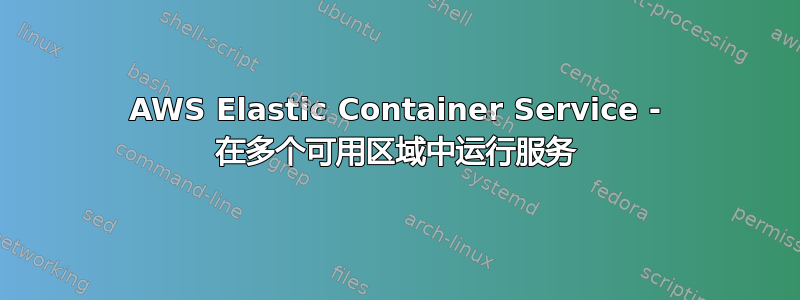
我正在通过 ECS 运行长时间运行的任务。容器实例分布在多个可用区。是否可以在 ECS 中定义,当任务有多个实例时,每个任务应在另一个可用区上运行(如果可能)?此功能对于高可用性和容错能力非常有用。现在,我的所有 5 个任务实例都可能在同一台机器上运行,因此当机器死机时,调度程序需要将所有任务放置在其他地方,这将导致服务停机。
希望你能帮助我。
答案1
今天宣布了 AZ 感知调度,所以这个问题现在得到了解决
答案2
我遇到了同样的问题。
目前,我正在使用自己的 AMI 和 docker 和 awscli。我将 ec2_Data 注入到 init 脚本中。此脚本启动 dockersn 应用 crontabs(用于 cloudwatch 指标和备份)并初始化警报。
我不想使用私有注册表或 dockerhub,我正在从 S3 加载 docker 镜像
s3curl --id clouddocker -- -s --retry 5 --retry-delay 30 URL.gz | gunzip|docker load
答案3
使用 ecs-cli,您可以定义子网。
>ecs-cli up --help
NAME:
up - Create the ECS Cluster (if it does not already exist) and the AWS resources required to set up the cluster.
USAGE:
command up [command options] [arguments...]
OPTIONS:
--keypair Specify the name of an existing Amazon EC2 key pair to enable SSH access to the EC2 instances in your cluster.
--capability-iam Acknowledge that this command may create IAM resources.
--size [Optional] Specify the number of instances to register to the cluster. The default is 1.
--azs [Optional] Specify a comma-separated list of 2 VPC availability zones in which to create subnets (these AZs must be in the 'available' status). This option is recommended if you do not specify a VPC ID with the --vpc option. WARNING: Leaving this option blank can result in failure to launch container instances if an unavailable AZ is chosen at random.
--security-group [Optional] Specify an existing security group to associate it with container instances. Defaults to creating a new one.
--cidr [Optional] Specify a CIDR/IP range for the security group to use for container instances in your cluster. Defaults to 0.0.0.0/0 if --security-group is not specified
--port [Optional] Specify a port to open on a new security group that is created for your container instances if an existing security group is not specified with the --security-group option. Defaults to port 80.
--subnets [Optional] Specify a comma-separated list of existing VPC Subnet IDs in which to launch your container instances. This option is required if you specify a VPC with the --vpc option.
--vpc [Optional] Specify the ID of an existing VPC in which to launch your container instances. If you specify a VPC ID, you must specify a list of existing subnets in that VPC with the --subnets option. If you do not specify a VPC ID, a new VPC is created with two subnets.
--instance-type [Optional] Specify the EC2 instance type for your container instances.


